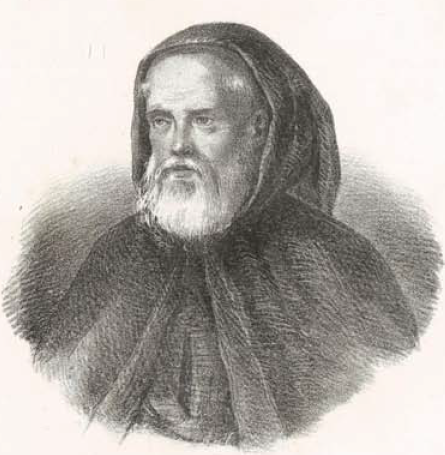Saint Ignatius of Laconi (1701- 1781) – not to be confused with the more famous Ignatius of Loyala – was a Franciscan friar, whom we celebrate on this May 11th, the day of his death. Born Ignazio Peis in Sardinia, he was one of seven children of poor peasants. He was drawn to the religious life from an early age, in which path he was confirmed by being apparently miraculously healed of a deadly illness at the age of 17. His parents at first objected, needing his help in the fields, but finally relented.
Ignatius joined the Friars Minor Capuchins at Cagliari, and spent the rest of his life in various humble tasks while the tumultuous world of the 18th century swirled around him. He was dedicated to the rule, and to obedience to his superiors, in ways that might seem odd from a purely natural vantage point. One story told is that Brother Ignatius, as the quester of alms, refused to take money from an infamous usurer, but did so when directly commanded. Upon his return to the convent, the bag with the money in it poured forth blood, which Ignatius said was the ‘blood of the poor’, squeezed from them’.
Brother Ignatius spoke rarely, but always charitably, going about this tasks, immersed in God and heavenly thoughts. These helped him crowd out whatever untoward imaginings may come into his mind:
I saw with my own eyes how the servant of God went about with downcast eyes. He always held his rosary in his hand. The children ran to him, and he gave them pieces of bread. When the people saw him passing by, they showed him the greatest respect. If some of them were quarreling, they kept silence at his approach
He died quietly at the hour of Divine Mercy, 3:00 pm, on May 11th, 1781, and miracles, many of which had been attributed to his intercession while alive, abounded. He was beatified by Pius XII in 1940, and canonized by the same pope in 1951, who declared
A hero of sanctity, of humble birth, who lived his life in lowly conditions… Long and difficult tasks seemed easy to him; easy, too, was the obedience he gave to his superiors. For him even the most painful corporal sufferings were light and sweet, all because he accepted whatever happened to him, whether agreeable or disagreeable, with complete resignation. He relied entirely on the will of God. That was the source of his strength.
Saint Ignatius’ body is still incorrupt, in its resting place in Cagliari, awaiting the resurrection of all the just.
Ora pro nobis, good and faithful servant.












